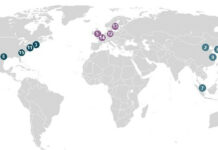By the BF Staff
In a new report from Emsi that tracked talent attraction and retention by county since 2011, Texas had 10 of the 31 highest-ranked large counties (those with at least 100,000 people) and 13 of the top 40 small counties (those under 100,000 population).
Florida, California, and a number of other Southern and Western states did well in the talent attraction ranking, but none approached the Lone Star State for the volume of highly ranked counties.
Travis County was the runaway No. 1 in Emsi’s scorecard, thanks to its remarkable net migration total compared to the rest of the country and its strong marks in skilled job growth. (Austin is also the top city for startup activity, according to the Kauffman Foundation.) Meanwhile, Harris County, home to Houston, ranked third and Collin County, just outside of Dallas, was No. 7.
Collin County and Montgomery County—in the Houston metropolitan area—were the only large counties to increase skilled occupation jobs by at least 20 percent from 2011 to 2015 and rank in the top 15 in net migration from 2013 to 2014.
In recent years more regions and communities have made a concerted effort to recruit and retain skilled talent. Part of this talent push has to do with the changing dynamics of economic development. But it also has to do with the simple fact that skilled labor is coveted. Randstad US found that an inadequate supply of qualified and skilled talent is the second-biggest threat to companies.
With more attention on developing and luring skilled workers, Emsi analyzed every county’s net migration, skilled job growth, overall job growth, regional competitiveness for skilled jobs (using shift-share analysis) and annual job openings. The five metrics were equally weighted to determine the best regions for talent attraction.
In addition to Texas, the most successful talent attraction pockets are scattered throughout the Sun Belt and West. California had 19 of the top 150 ranked counties, led by four Bay Area counties: San Francisco (No. 2), Santa Clara (No. 4), San Mateo (No. 10), and Alameda (No. 16). Riverside County also came in strong, at No. 12.
Florida had 18 of the top 150, headlined by Lee and Palm Beach counties (Nos. 20 and 21, respectively). Georgia and South Carolina each had eight of the top 150.
Michigan, topped by Kent County (No. 37), was the only upper Midwest state to fare well. The Northeast also struggled in Emsi’s talent attraction ranking. Pennsylvania’s top-ranked county was Lancaster at No. 270; Illinois’ was Will County at No. 186.
These weren’t the only states not represented in the top 150 large counties. In Connecticut, New Jersey, Minnesota and Wisconsin, the only counties close to the 150 were Minnesota’s Wright County (No. 162) and Anoka County (No. 167). Connecticut’s highest-ranked large county was Middlesex, at No. 371.
While most of Connecticut and other Northeastern states have seen considerable out-migration, Texas has seen the opposite trend. Five of the top 10 large counties for 2013-2014 net migration were in Texas.
TEXAS HAS A LONG REACH
A group of state and regional economic developers from across Texas are traveling to Chicago this month on a business development mission aimed at recruiting jobs and capital investment to the Lone Star State.
Organized by the Texas Economic Development Corporation in partnership with the Office of Governor Greg Abbott, the two-day trip is designed to carry the message that Texas is “Wide Open for Business” to corporate executives, site selectors and others involved in expanding and relocating businesses. The Texas delegation includes executives from American Electric Power, BNSF Railway, Center Point Energy and Oncor and economic development leaders from 10/35 Economic Development Alliance, Brownsville Economic Development Corporation, Dallas Regional Chamber, Greater Houston Partnership, McKinney Economic Development Corporation and Schertz Economic Development Corporation.
“Chicago and the Midwest are strategic business attraction areas for Texas with a wealth of companies that can benefit from our state’s advantageous business climate,” said Tracye McDaniel, President and CEO of Texas Economic Development Corporation and TexasOne, its privately funded non-profit marketing arm. “Through proactive outreach to targeted decision makers, we aim to keep the wave of companies coming to Texas.”
“Texas is the best state for business in the nation—bar none,” said Bryan Daniel, Executive Director for the Governor’s Office of Economic Development and Tourism. “Our goal is to make sure that message is heard loud and clear by the C-suite in the Windy City.”
Numerous companies headquartered in the Chicago region have existing operations in Texas, including Accenture, Archer-Daniels-Midland, Boeing, ThyssenKrupp America, Motorola Mobility and Wilson Sporting Goods. In June 2016, W. W. Grainger opened a new sales facility in San Antonio in a project expected to create at least 200 new jobs and $3.9 million in capital investment. A Texas Enterprise Fund (TEF) grant offer of $975,000 was extended to the company.
Recently ranked by Chief Executive magazine as the top state for business for the 12th year in a row, Texas offers the second largest civilian workforce in America, first-rate educational institutions and world-class infrastructure that enables companies to operate profitably on a global scale. With no corporate or personal income tax, Texas has one of the lowest tax burdens in the nation and also competes with aggressive incentives, including the TEF, Texas Enterprise Zone, Skills Development Fund and additional incentives offered at the local level.
The Chicago business recruitment mission includes a reception for corporate executives, an international roundtable with consulates and investment promotion agencies responsible for foreign trade and investment and a panel discussion, luncheon and meetings with site selection consultants, who are estimated to impact 40% of all of corporate relocations and expansions involving 100 or more jobs.
TOMBALL’S TIME IS NOW
Now is the time for Tomball, Texas. With a growing population and vast business opportunities, Tomball is experiencing what happens when strong partners decide to put skin in the game and invest in the future.
Knowing that Tomball was primed for solid growth, the Tomball Economic Development Corporation (TEDC) purchased 96.5-acres in 2011 and began developing a Business & Technology Park with plans to attract tenants in the energy, oilfield and medical services industries.

“One of Tomball’s biggest challenges with regard to economic development was the availability of land suitable for commercial/light industrial development,” said TEDC Executive Director Kelly Violette. “Tomball’s location is exceptional. We are essentially in the middle of Highway 290 and Interstate 45; however, part of our challenge was the lack of infrastructure available to support the types of businesses that are a natural fit for Tomball.”
Location is one of Tomball’s key advantages, with quick access to other business centers and communities throughout the region. The locational benefit of Tomball has really come into focus because of the Grand Parkway. “The completion of the Grand Parkway this year was a near-instant boom to the local economy because the new highway completely encircles the Houston area, and is literally at our back door,” Violette said.
The Parkway, also known as State Highway 99, provides 180 miles of connectivity, with numerous direct connectors to the major Houston-area highways. Shorter travel times and less congestion on roadways represent economic opportunity for Tomball. Existing and prospective businesses now have greater access to service areas and workforce, as well as improved access to the George Bush Intercontinental Airport, Interstate 45 and Interstate 10.
In conjunction with SH-99, the Tomball Tollway also opened this year with three lanes in each direction, bypassing seven stoplights. The frontage roads along the tollway have been in place for some time, and remain open to motorists who prefer those routes.
These two transportation projects have been planned for several decades, and factored into the TEDC’s decision to invest in the development of the Tomball Business & Technology Park.
The first company to take advantage of the newly-constructed Park was Canadian-based Packers Plus Energy Services. The company purchased 17.38 acres and plans to open its first phase, a 50,000-square-foot research and development facility, in the first quarter of 2017.
In addition to phase one, Packers Plus has plans to construct a 237,000-square-foot manufacturing building and a multi-story 40,000-square-foot corporate office building on the site. The estimated capital investment of the project is $21 million, and is expected to bring 353 new full-time jobs to the city of Tomball, with 172 of the jobs being created in the first five years of operation.
The company is an international oil and gas service company that is an innovator of multi-stage completion systems and provides solutions for challenging applications in horizontal, vertical, multi-lateral and high pressure/high temperature (HPHT) wells. Packers Plus created StackFRAC, an open hole multi-stage ball drop completion system.
“Packers Plus combines innovation, customer service, and technology and is a perfect fit for the business park,” said Violette. “They are a solid business with a commitment to long-term community partnerships.”
GE BETZ, Inc., a division of GE Power and Water, is the most recent Tomball relocation announcement. The company plans to move its Water and Process Technologies division to the Tomball Business and Technology Park in early 2018.
GE BETZ purchased a 5.5-acre-tract in August 2016 and is constructing a 42,700 square foot laboratory and office facility. The project will result in approximately $25 million in private capital investment and will create 75 new employment positions within the city of Tomball.
When asked why the Tomball Business & Technology Park was chosen for this project, George DeLong, GE’s Global Analytical Laboratory Manager for water and process technologies, said it was important for GE to start from the ground up, and it was a plus that some of their customers could be located in the park, providing greater business opportunities. He also added that the location provided a level of convenience for many of the division’s employees who live nearby. “We just felt this was an ideal situation,” said DeLong.
To learn more about Tomball, Texas and all it has to offer, visit www.tomballtxedc.org or call (281) 401-4086.
CEDAR HILL: WHERE BUSINESS OPPORTUNITIES GROW NATURALLY
It doesn’t take very long to figure out you’ve arrived some place special when you come to Cedar Hill. Maybe it’s the pristine natural beauty as you drive into town on our FM 1382 nature corridor, maybe it’s the high-end shopping that makes Cedar Hill the regional shopping destination for parts of four counties, or maybe the warm feeling you get at a restaurant where everyone really does “know your name.” Whatever the reason, Cedar Hill offers the perfect place to live, work and play in an environment that is simply different from any other, an environment where opportunities really do grow naturally.
Cedar Hill has enjoyed a longstanding culture of value-based leadership. A clear consistent vision, a commitment to develop and implement long-range plans, an expertise in developing partnerships and a solid focus on community all serve to guide not just where Cedar Hill is going, but why. The result is a stable, vibrant, and intentional environment that is not only business friendly, but a sound and prudent place to invest. Families, businesses and community grow organically in Cedar Hill and this works to create the kind of market place that discerning businesses need to start, thrive and grow. From tech start-ups to multinational companies, Cedar Hill has been designed to be a partner for business success. Being only half grown, and in the midst of one of the largest and fastest growing economies in the nation, Cedar Hill’s solid planning, friendly, stable environment and unique community and business amenities will continue to attract discerning businesses for many years to come.
A wide range of innovative planning is guiding Cedar Hill into its future. One of most exciting of these is the City Center Plan that is transforming Cedar Hill’s historic downtown and commercial core into the most unique urban center in the region. The mix of integrated residential, retail, office and community services highly connected with open spaces, trails, bike lanes, and eventually, transit rail is creating many exciting business opportunities and new ways of calling Cedar Hill home. Another key element is Cedar Hill’s innovative, sustainable land use planning, which balances growth with a deep commitment to preserving and connecting its natural spaces. Working in concert with its open space partners like Cedar Hill State Park and Dogwood Canyon Audubon Center, the City is preserving 20 percent of its land area to insure it will continue to flourish and set Cedar Hill apart as a model. Other plans include creating a vibrant tourist economy centered on Cedar Hill’s iconic natural attractions, historic downtown charm and high-end shopping attractions. Significant transportation infrastructure enhancements are planned, including capacity and congestion upgrades to U.S. 67, and also Future Loop 9, which will connect Cedar Hill’s industrial and commercial areas directly to I-45, I-35 and other fast-growing areas within an expansive trade area.
As the North Texas region continues to experience dramatic growth, the most successful communities will be those that are connected, distinctive and discerning about who they are and where they’re going. In this regard, Cedar Hill is uniquely positioned for business and community success.
As one of the oldest communities in Dallas County, commerce has always been a key part of the community and the environment. From its earliest days as a trading hub, agricultural center and railroad destination, to the vibrant, highly-diversified economy that is emerging today, Cedar Hill has been deliberately designed to perfectly balance quality business and community growth within the stunning natural beauty that makes Cedar Hill the prettiest part of North Texas.
Cedar Hill’s unique natural qualities, strategic central location, excellent connectivity and solid infrastructure supports a wide range of business sectors and are just a few of the reasons why so many national and regional brands of distinction are calling Cedar Hill home. Brands such as Dillard’s, H&M, JC Penny, Burlington Coat Factory and Home Depot all add to over 2 million square feet of retail and office space that make Cedar Hill a regional retail and business service hub. Cedar Hill’s industrial sector is exceptionally diversified. The ease of connectivity to the region, availability of freight rail, and abundant well-educated human capital promotes growth and profitability in industries from metal fabrication and distribution centers to commercial fixture and aeronautical component manufacturing.
Opportunities grow naturally in Cedar Hill with easy connections in the North Texas region. Located 20 minutes from downtown Dallas and 40 minutes from downtown Fort Worth with multiple connections to the rest of the DFW Metroplex; a 30-minute drive will take you to DFW International Airport or Dallas Love Field. For executive air travel, Dallas Executive Airport is only 15 minutes away. BNSF rail serves the Cedar Hill Business Park as well as other available sites in the City.
With the prime location for retail, recreational, residential, commercial and industrial opportunities, locating and growing a business in Cedar Hill is easy. Educational opportunities abound with a satellite campus of Cedar Valley College, part of the Dallas County Community College District co-located with the Best Southwest SBDC, and Strayer University. Combined with an active business community, a ready workforce, and a City that seeks growth, businesses naturally thrive here.
In addition to the prospering business climate, Cedar Hill has natural beauty. Cedar Hill State Park is nearly 2,000 acres and located on 7,500-acre Joe Pool Lake. The ruggedness and scenic beauty of the area combined with over 100 miles of shoreline and water based recreation activities make the one of the most visited state parks in Texas. Dogwood Canyon Audubon Center at Cedar Hill is situated on 205 acres of Dogwood Canyon, which contains the widest variety of rare species in North Texas as plants and animals from east, west, and central Texas converge there. Add this to an extensive city park system, and recreational opportunities abound. The Center, along with the State Park, is part of over 3,000 acres of protected natural space within the city, the highest percentage of preserved open space of any city in the DFW Metroplex area.
Towering above the DFW Metroplex, Cedar Hill offers some of the most breathtaking views around. The scenic rolling hills and surprising natural beauty are reminiscent of the Texas Hill Country, yet conveniently nearby, making Cedar Hill a preferred destination for nature enthusiasts, hikers, cyclists, mountain bikers, boaters, campers and adventure competitors of all kinds.
Bordered by 7,500-acre Joe Pool Lake, Cedar Hill is surrounded by parks, golf courses, public swimming, camping and outdoor activities. On its eastern shore, Cedar Hill State Park, one of the most visited state parks in Texas, features a full-service marina, biking and hiking trails and over 350 campsites.
U.S. DOD IS CONNECTING IN AUSTIN
The U.S. Department of Defense has established a new outpost of the Defense Innovation Unit Experimental (DIUx) in Austin, TX. DIUx is an initiative that will connect the Department of Defense with hundreds of private sector entrepreneurs and firms to enhance the technological capabilities of the U.S. military while growing innovative enterprises in Texas. Austin joins Silicon Valley and Boston in hosting the DIUx outposts, which will give entrepreneurs and leading research institutions access to capital investment for technology startups.
Secretary of Defense Ash Carter and University of Texas System Chancellor William McRaven announced the opening of the DIUx Austin outpost at the Capital Factory in Austin, and highlighted opportunities for area innovators to engage and partner with the Department of Defense to develop cutting-edge technologies to address the nation’s most pressing security challenges.
“Texas is the new frontier in innovation, and with the arrival of DIUx, the Department of Defense’s best technologists will be right here in Austin,” said Gov. Greg Abbott. “A DIUx outpost in Austin leverages two of Texas’ greatest strengths—our enduring commitment to the mightiest military in the history of the world and our faith in the innovators who drive this thriving economy.”
















![[VIDEO] Get More for Your Business in Ardmore. Oklahoma](https://businessfacilities.com/wp-content/uploads/2024/02/maxresdefault-324x160.jpg)
